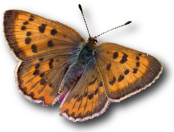
The taxonomy of this entity has undergone some very unfortunate turbulence recently. It used to be put in the species Hesperia comma, and its subspecifixc name used to be yosemite. The name harpalus was used for the East slope subspecies, which is very different. (Got that?) As now construed, harpalus refers to the single-brooded entity with a very lightly-marked, mostly golden ventral hindwing in the male and a highly variable spot-pattern on the same wing in the female, incorporating a c-shaped element on the basal half. It occurs on non-serpentine substrates, in dry meadows and along wood roads, visiting Pink Dogbane, Coyotemint, Eriogonum nudum, and other flowers. It flies in June and July, after H. lindseyi where they co-occur or come close, and as late as September at Donner. Hilltopping males are taken on Castle Peak. The West and East slope subspecies not only look very different; they have strong molecular-genetic differences and are only known to intergrade in the Feather River Canyon, north of our area. Larvae feed on perennial grasses. Oddly, the only host definitely identified at one of our sites is a naturalized exotic, Sweet Vernal Grass (Anthoxanthum odoratum).
